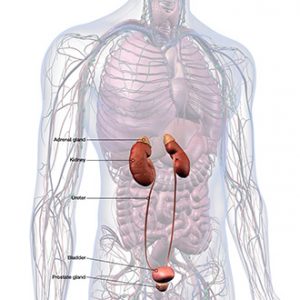What is Urethral Syndrome?
 When you have symptoms of a urinary tract infection but tests of your urine find very few or no bacteria, you may be diagnosed with urethral syndrome. It is also sometimes called symptomatic abacteriuria.
When you have symptoms of a urinary tract infection but tests of your urine find very few or no bacteria, you may be diagnosed with urethral syndrome. It is also sometimes called symptomatic abacteriuria.
Women have urethral syndrome much more often than men.
What is the cause?
Usually a cause of the symptoms cannot be found. Sometimes it may happen because the urethra or genital area may be irritated by:
- Sexual activity
- Soaps, antiseptic creams, or spermicides
- Dyes or perfumes in toilet tissue and feminine hygiene products, such as pads, tampons, and sprays
The urethra is the tube that drains urine from the bladder to outside the body. The glands around the urethra may be inflamed by infection or injury. Sex; use of a diaphragm, tampon, or pessary; or a long bike ride could injure the area. Some other possible causes are spasms of the muscles around the urethra, nerve problems caused by a herpes infection, or a disease such as diabetes. Psychological factors, such as stress, may also play a role.
After menopause, the symptoms may be the result of inflammation of the vulva (vulvitis). Less estrogen in a woman’s body after menopause may cause a thinning and inflammation of these tissues around the opening of the vagina and urethra.
What are the symptoms?
The symptoms of urethral syndrome are:
- Pain and discomfort in the lower abdomen
- A frequent urge to urinate
- A feeling of pressure in the lower belly that doesn’t go away after you urinate
- Pain around the vulvar region
- Pain with urination
- Pain with sex
How is it Diagnosed?
Your healthcare provider will ask about your symptoms and examine you. You will have a urine test. You may also have blood tests.
How is it treated?
If no infection is found, things you can do that may help your symptoms are:
- Avoid products that can cause irritation and allergic reactions, such as perfumed products, soaps, and spermicides.
- Practice good personal hygiene.
- Drink a lot of fluids, especially cranberry juice.
Your healthcare provider may prescribe Pyridium. This medicine helps you have less pain when you urinate. Pyridium will turn your urine orange and may stain underclothes. It should be used for no more than 2 days.
Estrogen pills or creams may relieve symptoms caused by vulvitis in older women. However, you and your provider should discuss the risks and benefits of hormone therapy because it may increase the risk for heart disease or stroke. It may also increase the risk of breast cancer, uterine cancer, and blood clots. Hormone medicines that are put into the vagina, such as vaginal cream or vaginal tablets, may have fewer of these risks.
Your healthcare provider may prescribe an antibiotic if your urine contains pus and a low number of bacteria even if there are not enough bacteria for the problem to be considered a true infection.
If sexual activity brings on your symptoms, your provider may prescribe medicine to relieve pain or an antibiotic. You may need to avoid having sex until your symptoms go away.
If the urethra has become narrower because of injury or infection, you may not be able to empty your bladder completely. Your provider may dilate the urethra with metal or plastic dilators to widen the opening and make it easier to urinate. Your provider will start with small dilators and gradually increase the size.
You may be given steroid shots in and around the urethra to decrease inflammation.
How long will the effects last?
Following your healthcare provider’s recommended treatment and precautions may help you feel better in a week or two. If you keep having symptoms, your provider may refer you to a doctor who is a specialist in problems of the urinary tract. The specialist (called a urologist or a urogynecologist) may do more tests. You may have a procedure called a cystoscopy, which uses a thin telescope to look into the urethra and bladder.
If you have urethral syndrome, you can also get a urinary tract infection. Call your healthcare provider if you have any new symptoms, such as headache, fever, chills, or blood in your urine.
How can I take care of myself?
- Drink plenty of fluids each day. The fluids help flush the bladder and the rest of the urinary tract.
- Keep the genital area clean, using just water. Don’t wash the genital area with soap.
- Don’t use bubble baths, bath oils, or other perfumed bath products.
- After you urinate, wipe from front to back. Use uncolored and unperfumed toilet tissue.
- Use sanitary pads or tampons that do not contain deodorants or perfumes.
- Don’t use feminine hygiene sprays or other perfumed hygiene products.
- Avoid sexual positions that can irritate or injure the urethra.
- Urinate before and after sex.
- Use prescribed medicines as directed by your provider.
- Keep all appointments for any follow-up exams.
How can I help prevent Urethral Syndrome?
In addition to taking the above steps, it may help to:
Wear cotton underwear, which allows better air circulation than nylon. Pantyhose should have a cotton crotch.
Avoid tight clothes in the genital area, such as control-top pantyhose and tight jeans.
Avoid bicycling often or for long periods of time, especially if you have a long-nose bicycle seat.
Make sure you have good lubrication in the genital area when you have sex.
